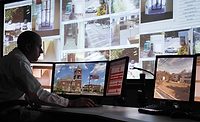Security Stacking: How to Address the Challenges it is Creating

As this was being written in mid-September 2020, fires are ravaging the West Coast, from California to Oregon; millions of acres have been burned and 33 people have lost their lives. Conflicting comments about climate change have been exchanged for years.
However, today, there is a much bigger situation "boiling," and I use the word "boiling" purposely. Clashing commentary about the fires and climate change are all part of a stew, boiling on the stove, one step away from exploding and causing civil unrest throughout the country.
The term for this boiling situation heard in some circles in the corporate and executive security industry is "stacking." Stacking can be defined as the piling of layers and layers of sudden lifestyle changes, serious health concerns due to COVID-19, social and economic problems, racial issues and social injustice, the growth of conspiracy theories and conspiracy groups, personal insecurities about the future, and conflicting visions about the direction of this country, all at once.
The United States is certainly not new to uncertainties and conflicts. However, we typically deal with one or two at a time:
- The 1918 Spanish Flu was long gone before the Great Depression began in the 1930s, allowing us to focus just on our economic issues.
- There were few conflicting visions when the Japanese struck Pearl Harbor. Millions of Americans signed up, virtually overnight, all with one focus: to protect and defend the country.
But now we are all grappling with several major issues at the same time. Further, these issues are threatening corporate security and the safety of our employees and executives. Challenges have developed for many firms, their top executives, their staff, and their assets, both tangible and intangible, that did not exist just a few months ago.
Further, these issues are threatening corporate security and the safety of our employees and executives. Challenges have developed for many firms, their top executives, their staff, and their assets, both tangible and intangible, that did not exist just a few months ago.
This means that as corporate security professionals, we have a lot on our plates. To address these situations, we need to know what steps we can take - and take quickly - to ensure our clients are safe and their business operations continue, and to help them manage through these exceedingly complicated times.
Defining Who We Are and Moving Forward
An effective working definition of corporate security professionals is the following: Corporate security professionals identify and effectively lessen, mitigate, or manage, situations and events that have the potential to threaten the resilience and continued survival of a corporation, the safety of its top executives, staff, and assets. Corporate security professionals oversee, manage, and coordinate a variety of tasks, within and outside a company, to ensure its security, continuity, and safety.
Building on this basic definition, we can now consider several steps we can take to keep our clients safe and their businesses operating.
Ensure Cybersecurity
COVID-19 has caused millions of workers in the United States to stop commuting to their places of work. Just to see how quickly things have changed, as recently as March 1, 2020, the idea of having entire companies shift to remote work was unheard of. Now, most companies have some if not most of their staff working remotely.
This migration to remote work was born of necessity. But it happened so quickly that many IT professionals did not have time to implement data security programs that would allow people to cooperate safely and securely from home. Steps must be taken now to ensure remote workers can interface freely and securely with corporate databases and information sources.
Guarantee a Healthy Reopening
Businesses and employers should plan to protect the health of their staff when they return to work. To do this, businesses must take proactive steps. They must continue to monitor credible news sources that provide information about the virus and how people can protect themselves against it.
Corporate security professionals must also ensure that their clients strictly adhere to the guidance provided by the government and public health authorities. This would include the following:
- Identify a workplace coordinator who will be responsible for COVID-19 health issues and their impact in the workplace.
- Review all cleaning strategies in place to ensure they are designed to minimize the spread of the infection.
- Implement flexible sick leave and supportive policies and practices for employees.
- Determine how the business will operate if absenteeism spikes from increases in sick employees.
- Decide what steps to take if staffers must stay home to care for sick family members or children unable to go to school.
- Implement protocols to ensure adherence to mask-wearing and social distancing.
Physical Security
When we discuss physical security, we are referring to the bodily protection of an organization’s executives and staff, both on- and off-site. This would also include when they are traveling for the organization.
In the coming months, our industry should expect to see several changes when it comes to physical security, including:
- Demand for security guards will increase sharply. This will necessitate training in crowd control, “temperature monitoring” of crowds, attending civil unrest events, accurately reporting on these events, overcrowding prevention, and how to control situations before they get out of hand.
- Organizations may face an urgent need to engage with executive protection (EP) vendors due to an increase in social unrest, crime or other factors associated with the “stacking” of issues we are facing. You should consider that during these “spikes” everyone will be looking to engage these services which will be in short supply. Consider retaining a service now in anticipation of spikes. This may be the prudent step to take.
- Retailers and other organizations will need to provide curbside delivery for customers while still ensuring minimal points of contact, and contactless delivery of products will need to be developed. In all cases, social distancing and personal and site hygiene will be required.
- New passive and active monitoring, reporting, and enforcing technologies will be necessary to offset the high cost of paid guards. However, while physical safety is the goal, existing and evolving technologies must still comply with privacy requirements.
These changes will dictate revisions to best practices, which will then have to be taught to management and staff. Further, to ensure physical security, organizations will need to make several changes to their facilities (most of which were not even a consideration just a few months ago), such as compartmentalization of staff to help minimize personal interactions; social distancing markers; plexiglass barriers and other social separation devices; and temperature monitoring stations.
In some jurisdictions, these changes and others are not only recommended but may be required, making businesses and other organizations responsible for their proper implementation.
Business Continuity
There is hardly any business that has been immune to the ravages of COVID-19. Addressing the impact, organizational resilience, and the ability to make changes quickly is key to successful business reopening and continuity.
Corporate security professionals must develop solid business continuity protocols for their clients based upon a three-pronged approach:
- Prepare. Get ready for what is coming next. Allocate resources, assign roles, set priorities, establish a command center, train, and practice.
- Predict. Create the tools required to monitor vulnerabilities and threats and bring them to the attention of decision-makers.
- Prevent. Prevention will largely depend on resilience as well as evolving and established security procedures and preparations that can be leveraged to help in a crisis, no matter what form it takes.
This three-pronged approach, in conjunction with the other steps, should help ensure a safe, secure, and healthy reopening for businesses around the globe. Further, and just as important, sound business continuity protocols can help ensure that businesses stay open.
The virus has already caused too many businesses to fall by the wayside. As corporate security professionals, our goal is to help ensure our clients avoid that fate, remain viable, and remain in operation.
Looking for a reprint of this article?
From high-res PDFs to custom plaques, order your copy today!







